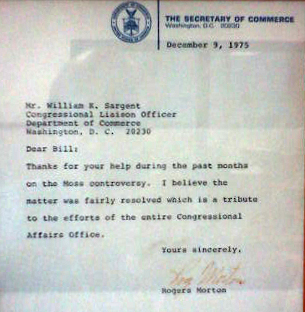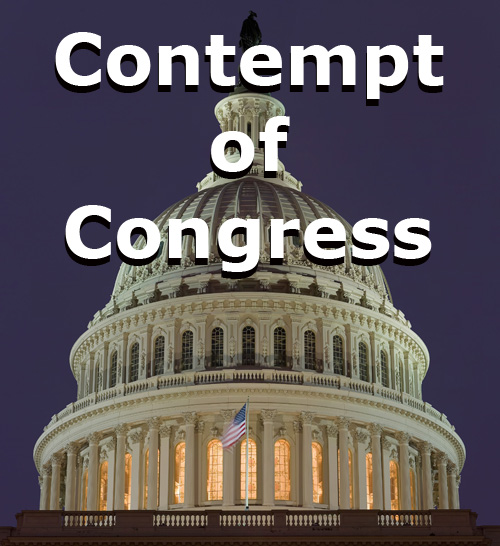A Personal Experience with
Contempt of Congress:
In 1975 I worked in Congressional and Legislative Affairs for the U.S. Department of Commerce. Our Secretary was a former Maryland Congressman -- Rogers C.B. Morton.
That year Congressman John Moss (D-CA) Chairman of the Oversight Subcommittee of House Commerce was attempting to get documents from the Department of Commerce. As you may know, the Department controls about five percent of U.S. exports for national security reasons (e.g., items that have a perfectly legitimate business purpose but also could be used for nuclear, chemical, biological weapons or missile delivery systems).
These licenses often contain business proprietary information which is protected from release. It was access to these licenses which Chairman Moss was determined to get.
Secretary Morton was subpoenaed and at a subcommittee hearing Moss went on for about ten minutes as to why he needed this information. Morton just sat there and let Moss go on and on until the Chairman finally stopped. Then former Congressman, now Secretary, Morton leaned forward and in a polite but determined voice simply said in the microphone "Now John, you know I can't do that!" Moss turned all shades of red and I thought he was going to burst a blood vessel! Moss threatened to find Morton in Contempt of Congress.
Morton was willing to give the documents to the Committee which had jurisdiction over the Export Control program (the Committee on Foreign Affairs) but not the Commerce committee. After months of negotiating the Secretary released the information to the Foreign Affairs Committee which acted as the guardian of the confidential information and shared only that information that was actually needed by the Commerce Committee. The issue was not about providing documents, but who should get them.
Moss was successful in getting a Contempt of Congress resolution passed by his Subcommittee but, if I remember correctly, it was never taken up in the full committee or on the House floor.
After it was all over Secretary Morton wrote the following note to me.

You might find a chronology of the events surrounding Operation Fast and Furious of interest.
[This is a summary, but it includes lots of information and links to source documents.]
Background information on Contempt of Congress
|
Congress finds Attorney General Holder
in Contempt of Congress:
On Thursday, June 28, the House of Representatives considered and by a vote of 255 to 67 found Attorney General Eric Holder in Contempt of Congress for failing to provide key information pertaining to Operation Fast and Furious. This makes Holder the first sitting Cabinet member to be held in contempt. The vote was supported by 17 Democrats who broke ranks with their party to support the Contempt Citation.
Why did it come to this?
If you read the story in the lefthand column, you will see that usually the executive branch does whatever it can to avoid such a confrontation. It tries to find mutual ground. But this Administration seems unwilling to do so -- rewind to the early 1970s and Watergate. Could it be that the Obama Administration has something to hide or is it just another example of them thumbing their nose at the Congress? [Other examples 1 | 2]
[Follow the Fast and Furious Chronology that led up
to the Contempt of Congress resolution.]
Fox News Reported: The vote follows a roughly 16-month investigation by the chamber’s House Oversight and Government Reform Committee into the failed gun-running sting known as Fast and Furious -- run by the Bureau of Alcohol, Tobacco, Firearms and Explosives, a division of the Justice Department led by Holder.
Committee Chairman Darrell Issa, R-Calif., filed two subpoenas over that period requesting additional information. But he has more recently focused on information related to a February 2011 letter to Congress that falsely claimed the ATF was unaware the operation involved the underground sale of the assault weapons.
“Today, a bipartisan majority of the House of Representatives voted to hold Attorney General Eric Holder in contempt for his continued refusal to produce relevant documents,” Issa said after the vote. “This was not the outcome I had sought and it could have been avoided had Attorney General Holder actually produced the subpoenaed documents he said he could provide.”
So what is the impact of this action?
The House can now fight the President and the Justice Department in the courts pursuing a criminal contempt case or a civil case to compel the President/Holder to turn over the subpoenaed documents. The problem, however, is that a contempt citation against the Attorney General would presumably expire when the term of the current Congress ends in January. That means that the Congress doesn't have much time to act and the courts are notorious for not moving very quickly!
Usually the threat of finding a person in Contempt of Congress is enough for the parties involved to work out an accommodation.
| The accommodation in the story [left] happened not because of the threat of such a citation but because the executive branch was actually seeking to find a workable solution. In the case of Attorney General Holder, many would argure that such is not the case. In fact, many are contending that the Obama Administration is acting more like the Nixon Administration during the Watergate era. |
If the courts do end up deciding the case, they could shed some light on a constitutional law issue. "What happens when Congress demands that a president turn over documents he says should be kept secret, particularly, once the president invokes executive privilege to deny Congress documents it has subpoenaed?"
The last time this issue was raised was during Watergate, but it has been an issue since George Washington's time. Arguments over the proper use and limits of Executive Privillege have never been definitively decided. The Congressional Research Service tells us It's "vague and essentially undefined terrain."
Its a pretty good bet that at some point -- perhaps after President Obama leaves office -- the light of truth will reveal whether there has been a cover up, whether Fast and Furious was an attempt to further the cause of gun control, or whether it was just a bad idea that went South. But until the information sought by both the House and Senate committees becomes available, you and I can only wait and see what happens. |
Background on Contempt of Congress:
Contempt of Congress is the act of obstructing the work of the United States Congress or one of its committees. In modern times, contempt of Congress has generally applied to the refusal to comply with a Congressional subpoena — usually seeking to compel either testimony or the production of documents.
History
In 1857, Congress enacted a law which made "contempt of Congress" a criminal offense against the United States.
Subpoenas
Congressional rules empower standing committees with the authority to compel witnesses to produce testimony and documents for subjects under its jurisdiction. Committee rules may provide for the full Committee to issue a subpoena in furtherance of this process.
The Congressional committee must meet three requirements for its subpoenas to be "legally sufficient."
• First, the committee investigation of the broad subject area must be authorized by its Chamber;
• Second, the investigation must pursue "a valid legislative purpose" but does not need to involve legislation and does not need to specify the ultimate intent of Congress; and
• Third, the specific inquiries must be pertinent to the subject matter area that has been authorized for investigation.
|

|



 Your Are Here: Home > Operation Fast and Furious > Attorney General Eric Holder found in Contempt of Congress
Your Are Here: Home > Operation Fast and Furious > Attorney General Eric Holder found in Contempt of Congress
